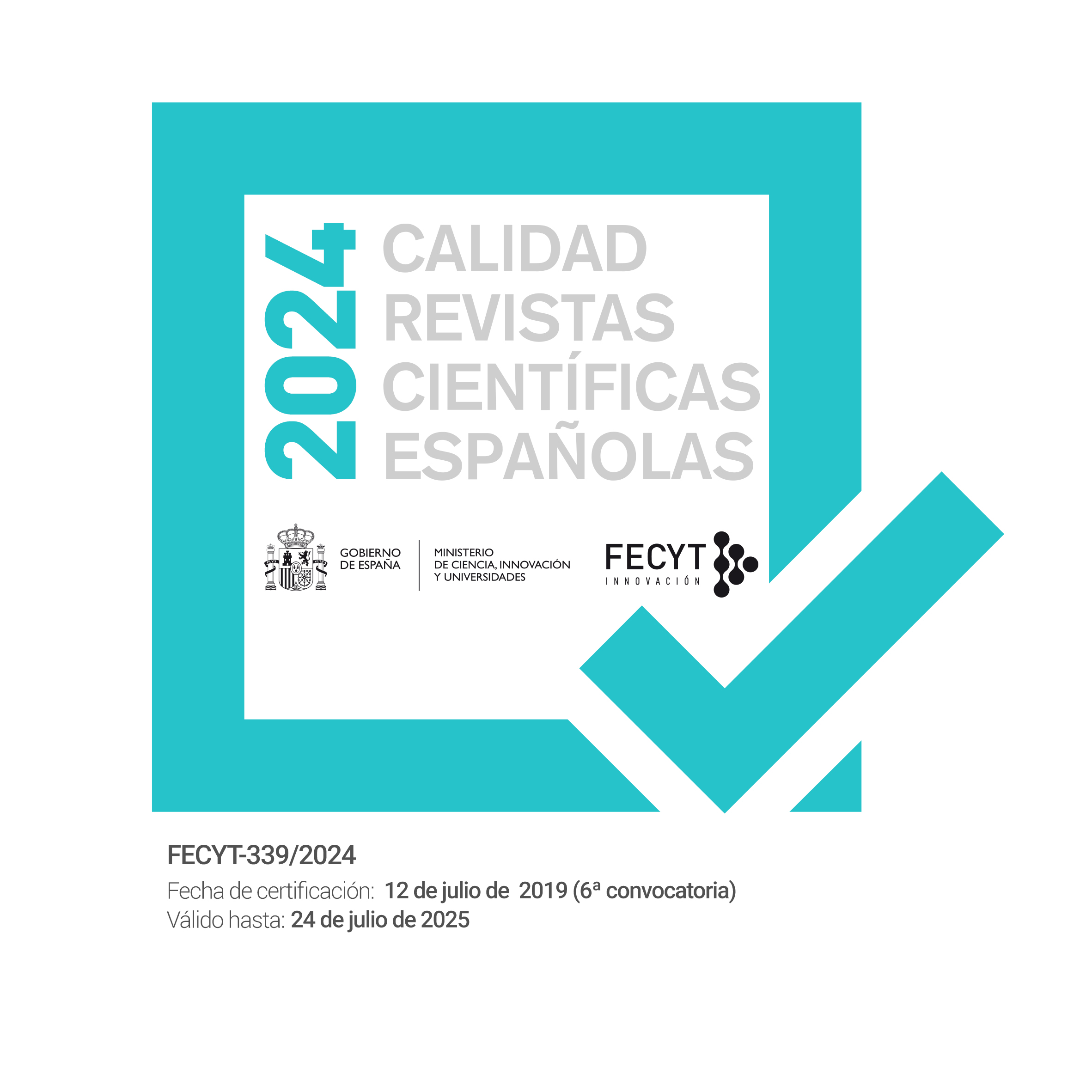Life and void
On Fichte’s rejection of F. Schlegel’s Witz and irony
DOI:
https://doi.org/10.24310/crf.17.1.2025.15713Keywords:
Wit, irony, idea, romanticism, idealism, dogmatismAbstract
This paper studies Fichte's rejection of the concepts of wit (Witz) and irony as it appears in the work Grundzüge des gegenwärtigen Zeitalters (1806). It is emphasized that this is the critique of a particular form of wit and irony, namely romantic. More rigorously, the opposition is shown with respect to the way in which Fichte alludes to the role of these concepts in subjective life, in relation to how Friedrich Schlegel reflects on them. The affinity between Fichte's theory and Hegel's philosophical development of the concept of irony - also insofar as the latter analyzes Schlegel's philosophy - is also highlighted. On this basis, it is hypothesized that Fichte's and Hegel's rejection of Schlegel's wit and irony is based on a religious and dogmatic overturning of their idealistic philosophical ideas. In parallel with this reading, it is stressed that it is only from the enhancement of Schlegel's consideration of the concepts studied -prior to his own turn towards religion and dogmatism-, that idealist -and romantic- philosophy can remain as a thought, besides coherent, valuable when conceiving the development of the existence of the subject in the world as a void in constant process of being filled.
Downloads
Metrics
Publication Facts
Reviewer profiles N/A
Author statements
Indexed in
-
—
- Academic society
- N/A
- Publisher
- Asociación para la promoción de la filosofía y la cultura en Málaga (FICUM) y UMAEditorial
References
J. G. Fichte-Gesamtausgabe der Bayerischen Akademie der Wissenschaften, R. Lauth et al. (hrsg.). Stuttgart-Bad Cannstatt, Frommann
Holzboog, 1962ss.
Theorie-Werkausgabe – Werke in zwanzig Bänden auf der Grundlage der Werke von 1832-1845 neue edierte Ausgabe, Eva Moldenhauer
und Karl Markus Michel (hrsg.), Frankfurt a. M., Suhrkamp, 1969ss.
Kritische Friedrich Schlegel Ausgabe, E. Behler, J. J. Anstett, H.
Eichner (hrsg.), 22 Bde., München - Paderborn - Wien, Verlag Ferdinand Schöningh, 1958.
Novalis, Werke, Tagebücher und Briefe, H-J. Mähl, und R. Samuel (hrsg.), 3 Bde. München-Wien, Carl Hanser Verlag, 1978.
Fichte, J. G. (1975): Doctrina de la ciencia, traducción de Juan Cruz Cruz. Buenos Aires: Aguilar.
Fichte, J. G. (1984): Primera y segunda introducción a la teoría de la ciencia, traducción de José Gaos. Buenos Aires: Sarpe.
Hegel, G. W. F. (2010): Diferencia entre los sistemas de filosofía de Fichte y Schelling, traducción de Joaquín Chamorro Mielke. Madrid: Gredos.
Hegel, G. W. F.(2005): Enciclopedia de las ciencias filosóficas, traducción de Ramón Valls Plana. Madrid: Alianza.
Hegel, G. W. F.(2007): Fenomenología del espíritu, traducción de Wenceslao Roses. Buenos Aires: FCE.
Hegel, G. W. F.(2000): Fe y saber, o la filosofía de la reflexión de la subjetividad en la totalidad de sus formas como filosofía de Kant, Jacobi y Fichte, traducción de Vicente Serrano. Madrid: Biblioteca Nueva.
Hegel, G. W. F.(2006): Filosofía del arte o Estética, traducción de Domingo Hernández Sánchez. Madrid: Abada editores.
Hegel, G. W. F.(1968): Filosofía del Derecho, traducción de Angélica Mendoza de Montero. Buenos Aires: Claridad.
Hegel, G. W. F.(2016): Lecciones sobre la filosofía de la historia universal, traducción de José Gaos. Titivillus – Editor Digital.
Hegel, G. W. F.(1975): Principios de la filosofía del derecho o derecho natural y ciencia política, traducción de Juan Luis Vermal. Buenos Aires: Sudamericana.
Schlegel, F. (1987): Lucinde, traducción de Berta Raposo. Valencia: Editorial Natán.
Schlegel, F. (1983): Obras Selectas, traducción de Miguel Ángel Veda Cernuda. Madrid: Fundación Universitaria Española.
Schlegel, F. (1994): Poesía y filosofía, traducción de Diego Sánchez Meca & Anabel Rábade Obradó. Madrid: Alianza.
Spinoza, B. (2004): Ética demostrada según el orden geométrico, traducción de Vidal Peña. Madrid: Editora Nacional.
Albert, G. (1993): «Understanding irony: Three essais on Friedrich Schlegel», MLN, vol. 108, n° 5, pp. 825-848.
Arrese Igor, H. O. (2019): «Morality and State in the Fichtean political philosophy», Araucaria. Revista Iberoamericana de filosofía, Política, Humanidades y Relaciones Internacionales, n° 41, pp. 79-96.
Benéitez Andrés, R. (2016) «El concepto de ironía en la estética de Friedrich Schlegel: contexto y recepción», Daimon. Revista internacional de filosofía, n° 67, pp. 39-55.
Benjamin, W. (2000): El concepto de crítica de arte en el romanticismo alemán, traducción de J. F. Yvars y V. Jarque. Barcelona: Península.
Biemel, W. (1962): «La ironía romántica y la Filosofía del idealismo alemán», Convivium, n° 13-14, pp. 27-48.
Bidon-Chanal, L. (2010): «La mímesis romántica. Novalis, Friedrich Schlegel y la superación del principio de imitación», Boletín de Estética, n° 14, pp. 51-66.
Casas Dupuy, R. (1999): «Apuntes sobre la crítica hegeliana de la ironía», Ideas y valores, n° 110, pp. 21-31.
Çeşmeli, I. (2018): «Kierkegaard’s concept of irony and his critiques on romantic irony», MetaZihin, n° 1, pp. 141-157.
Cioran, E. M. (2005): Desgarradura, traducción de Amelia Gamoneda. Buenos Aires: Tusquets.
Cometa, M. (2015): «Incomprehensibility and irony. The romantics roots of a cultural strategy», Kritisches Journal 2.0, n° 1, pp. 31-43.
Dahlstrom, D. (2014): «Play and irony: Schiller and Schlegel on the liberating prospects of aesthetics», en: Th. Nenon (ed.),
Kant, Kantianism and Idealism. The origins of continental philosophy. Oxfordshire: Routledge, pp. 107-129.
Figueroa Weitzman, R. (2004): «Kierkegaard y la ironía», Revista de filosofía. Universidad de Chile, n° 60, pp. 93-107.
Findler, R. (2004): «Why be witty. Fichte and Kant on the nature of wit with a view to wit's political ramifications», The European legacy, vol. 9, n° 3, pp. 331-341.
Frank, M. (1989): Einführung in die frühromatische Ästhetik. Fráncfort d.M: Suhrkamp.
Frischmann, B. (2019): «The philosophical relevance of romantic irony», en E. Millán Brusslan & J. Norman (eds.), Companion to German
Romanticism. Leiden/Boston: Brill, pp. 173-194.
Galfione, M. V. (2014): «Autoconciencia e ironía. Una lectura acerca de los orígenes del pensamiento romántico de Friedrich Schlegel», Revista de ilología alemana, pp. 53-71.
Galfione, M. V. (2018): «Modernidad, estética y subjetividad. Una reconstrucción histórico-conceptual de las reapropiaciones del pensamiento de Friedrich Schlegel en el marco de la filosofía alemana contemporánea», Areté. Revista
de filosofía, vol. XXX, n° 1, pp. 43-70.
Gaos, J. (1976): «Introducción», en J. G. Fichte, Los caracteres de la edad contemporánea, traducción de José Gaos. Madrid: Revista de
Occidente S.A, pp. 9-17.
Garnica, N. (2017): «Critical irony or the lovers of ruins: The aesthete, the dandy and the flâneur», Tópicos, revista de filosofía, n° 52, pp. 151-172.
Garnica, N. (2018): «La ironía romántica: entre romanticismo y deconstrucción», Revista de Humanidades, n° 37, pp. 189-220.
Heine, R. (1974): Transzendentalpoesie: Studien zu Friedrich Schlegel, Novalis und E.T.A. Hoffmann, Bonn: Bouvier.
Immerwahr, R (1951): «The subjectivity or objectivity of Friedrich Schlegel’s poetic irony», The German Review: Literature, Culture, Theory, n° 26:3, pp.173-191.
Kohns, O. (2007): «Romantische Ironie und die Möglichkeit von Metaliteratur», en J. Hauthal – J. Nadj – A. Nünning – H. Peters
(eds.), Metaisierung in Literatur und anderen Medien. Berlin: De Gruyter, pp. 194-205.
Landenne, Q. (2009): «Spéculation et liberté dans la philosophie de l´histoire du Caractère de l’époque actuelle de J. G. Fichte (1804-1805)», Revue de métaphysique et de morale, n° 64, pp. 469-487.
Löwith, K. (2007): Historia del mundo y salvación. Los presupuestos teológicos de la filosofía de la historia, traducción de Norberto Espinosa. Buenos Aires: Katz Editores.
Luz de Medeiros, C. (2014) «A forma do paradoxo: Friedrich Schlegel e a ironia romântica», Trans/Form/Acão, Marília, vol. 37, n° 1, pp. 51-70.
Millán Brusslan, E. (2010): «Searching for modern culture’s beautiful harmony: Schlegel and Hegel on irony», Bulletin of the Hegel Society of Great Britain, n° 62, pp. 61-82.
Naschert, G. (1997): «Friedrich Schlegel über Wechselerweis», Athenäum. Jahrbuch für Romantik, n° 7, pp. 11-36.
Portales, G. (2020): «Sistema, ironía e historia: Friedrich Schlegel y Hegel en disputa», Alpha, n° 50, pp. 125-143.
Prang, H. (1972): Die romantische Ironie, Darmstadt: Wissenschatliche Buchgesellschaft.
Reid, J. (2017): «Friedrich Schlegel and romantic psychology: The fragmentary self as ironic system», en D. Emundts & S. Sedgwick (eds.),
Internationales Jahrbuch des Deutschen Idealismus – Psychologie, Bd. 15. Berlin: De Gruyter, pp. 269-292.
Reid, J.(2019): «Hegel’s critique of romantic irony», en E. Millán Brusslan & J. Norman (eds.), Companion to German Romanticism. Leiden/Boston: Brill, pp. 241-257.
Reid, J. (2014): The anti-romantic. Hegel against ironic romanticism, London, Bloomsbury.
Rosaleny, V. R. (2007): «Schlegel y los enemigos de la ironía romántica», Anales del seminario de Historia de la Filosofía, vol. 24, pp. 155-170.
Rush, F. (2016): Irony and idealism. Rereading Schlegel, Hegel and Kierkegaard, Oxford: Oxford University Press.
Rush, F. (2006): «Irony and romantic subjectivity», en N. Kompridis (ed.), Philosophical Romanticism, London, Routledge.
Sánchez Meca, D. (1994): «Estudio Preliminar», en D. Sánchez Meca (ed.), F. Schlegel Poesía y filosofía, traducción de Diego Sánchez Meca. Madrid: Alianza, pp. 9-43.
Serrano, V. (2015): «Estética e ironía. La recepción de la filosofía de Fichte por Friedrich Schlegel en el periodo de Jena», Anuario Filosófico, n° 48/2, pp. 281-298.
Serrano, V.(2019): «Ética y filosofía de la historia en Fichte», Pensamiento, vol. 75, n° 284, pp. 621-638.
Serrano, V. (2011): «Sobre la beatitudo y el mal y la diferencia última entre Fichte y Schelling en torno a lo absoluto», Revista de Estud(i)os sobre Fichte, n° 3, pp. 1-20.
Utteich, L. C. (2020): «Educación al revés de la letra en las Lecciones sexta y séptima de los Grunzüge (1806)», Cadernos de filosofia alemã, vol. 25, n° 2, pp. 193-221.
Downloads
Published
How to Cite
Issue
Section
License
Copyright (c) 2024 Lucas Damián Scarfia

This work is licensed under a Creative Commons Attribution-NonCommercial-ShareAlike 4.0 International License.
Esta revista provee acceso libre inmediato a su contenido bajo el principio de hacer disponible gratuitamente la investigación al público. Todos los contenidos publicados en Claridades. Revista de Filosofía, están sujetos a la licencia Creative Commons Reconocimento-NoComercia-Compartirigual 4.0 cuyo texto completo puede consultar en <http://creativecommons.org/licenses/by-nc-sa/4.0>
Es responsabilidad de los autores/as obtener los permisos necesarios de las imágenes que están sujetas a derechos de autor.
Los autores/as cuyas contribuciones sean aceptadas para su publicación en esta revista conservarán el derecho no exclusivo de utilizar sus
contribuciones con fines académicos, de investigación y educativos, incluyendo el auto-archivo o depósito en repositorios de acceso abierto de cualquier tipo.
La edición electrónica de esta revista esta editada por la Editorial de la Universidad de Málaga (UmaEditorial), siendo necesario citar la procedencia en cualquier reproducción parcial o total.

















6.png)
